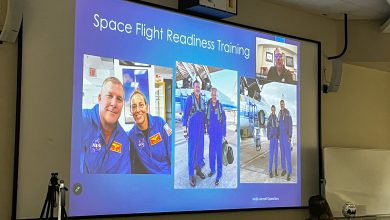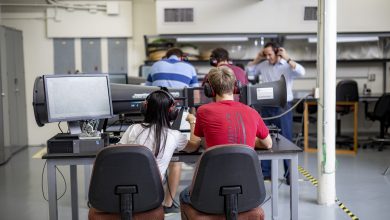Survey Confirms Parents Fears, Confusion Over Autism
MELBOURNE, FLA. — The first national survey of attitudes toward autism reveals that a small but significant percentage of people still believe the disease is
caused by childhood vaccines. The survey of 1000 randomly selected adults was conducted for the Florida Institute of Technology.
Nearly one in four (24 percent) said that because vaccines may cause autism it was safer not to have children vaccinated at all. Another 19 percent were
not sure. This at a time when the Centers for Disease Control reports that autism affects one in 150 children born in the United States.
Scientists say there is no evidence linking vaccines and autism, but the lingering fear is leading to fewer parents having their children vaccinated and a
growing number of measles infections. The New York Times reported in August that measles cases in the first seven months of 2008 grew at the fastest rate
in more than a decade and cases in Britain, Switzerland, Israel and Italy are said to be soaring.
The public’s concern over vaccines stems from a controversial 1998 British study linking autism and the MMR vaccine. Other childhood vaccines at the time
contained the mercury-based preservative thimerosal. The British study was later retracted by most of its authors and thimerosal was removed from nearly
all childhood vaccines in 2001, but responses to the just-completed survey show the public is still confused.
Florida Institute of Technology commissioned the survey, which asked specifically about the link between the preservative and autism. Nineteen percent of
the respondents agreed with the statement “Autism is caused by a preservative once found in childhood vaccines.” An additional 43 percent were not sure,
meaning fewer than half (38 percent) of the respondents believe no link exists between the vaccine and autism.
Part of the confusion may stem from the fact that the cause of autism is unknown, according to Florida Tech Assistant Professor of Psychology Celeste
Harvey. More than three in four respondents (76 percent) to the national survey agree with the statement: “At this time, scientists don’t know exactly what
causes autism.”
“Fear of the unknown, coupled with anxiety over the growing incidence of the disease, may be leading people to draw their own conclusions,” said Harvey.
The first national survey of the public’s knowledge and understanding of Autism was conducted for the School of Psychology at Florida Institute of
Technology, Melbourne, Fla. The survey includes responses from 1000 men and women, 21 years old or older, randomly selected from throughout the nation. The
poll has a plus or minus 3.1 percent confidence interval at a 95 percent level of confidence. The telephone interviews were conducted between August 1 and
August 29 by GDA Education Research, Mount Pleasant, S.C.
In addition to asking whether a link exists between autism and childhood vaccines, the survey explored people’s knowledge of the disease, their exposure to
people with autism and their support for early intervention programs. More results of the survey will be released at the Institute’s 2008 Autism Conference
on Friday, Oct. 3, in Melbourne. More information can be found at http://research.fit.edu/autismconference.
First National Public Opinion Survey:
Americans’ Knowledge and Understanding of Autism, 2008
School of Psychology
Florida Institute of Technology
Melbourne, Florida
Highlights
The first national survey of the public’s knowledge and understanding of autism was conducted for the School of Psychology at Florida Institute of
Technology, Melbourne, Florida. The survey includes responses from 1000 men and women, 21 years old or older, randomly selected from throughout the nation.
The poll has a plus or minus 3.1% confidence interval at a 95% level of confidence. The telephone interviews were conducted between August 1 and August 29
by GDA Education Research, Mount Pleasant, SC.
• With autism now the fastest-growing developmental disability in the United States, more than 80% of survey respondents say every state should have an
early intervention program for children from birth to age three. An even larger percentage (83%) thought that finding a cure for autism should be a
national priority. This at a time when the Centers for Disease Control reports that autism affects one in 150 children born in the United States.
• Nearly one in four (24%) respondents said that because vaccines may cause autism it was safer not to have children vaccinated at all. Another 19% were
not sure. The Centers for Disease Control says “evidence from several studies examining trends in vaccine use and changes in autism frequency does not
support such an association. Furthermore, a scientific review by the Institute of Medicine (IOM) concluded that ‘the evidence favors rejection of a causal
relationship between thimerosal-containing vaccines and autism.’ CDC supports the IOM conclusion.” [www.cdc.gov]
• About eight of ten (82%) respondents know that autistic people of all ages can benefit from treatment and 77% say behavioral therapists are key
individuals in the treatment of people with autism. An additional 73% believe behavior therapies are the most effective way to get autistic individuals to
maximize their capabilities.
• About four of ten (39%) survey respondents know a person with autism. They had a better understanding of the disorder, except for its cause, than those
who do not know someone with autism. Those who know someone with autism are more likely (21% vs. 17%) to believe the disorder was caused by a preservative
once found in childhood vaccines.
• Young parents feel better informed than older parents about autism and tended to be much more concerned that their children would be autistic. Nearly
eight of 10 (77%) of all parents were either not concerned their children would be autistic or not aware of autism, For younger parents (ages 21-28), 63%
were slightly, very or extremely concerned their children would be autistic. Only 10% of parents in their seventies and 14% of those in their sixties were
slightly, very or extremely concerned their children would be autistic.
• Six of ten (61%) of respondents feel informed or very informed about health issues in general, but only 26% feel familiar or very familiar about autism.
Those who described themselves as being very familiar with autism (9%) were more likely to consider it a high priority for funding (36%).
• Nearly six of ten (58%) respondents think the presidential candidates should have a plan for curing autism.
• About half of all respondents (48%) feel the national media do a good, very good or excellent job in keeping them up-to-date on health issues and
research. Slightly more than half (52%) say the national media do an average or poor job. Nearly two of three (64%) respondents believe the media give less
or much less attention to autism than it deserves.
• The 39% of respondents who said they knew a person with autism tended to be female (65%), white (75%), middle-aged (57% were between 29 and 58) and
well-educated (54% had at least a bachelor’s degree).
• Respondents who were deemed to be knowledgeable about autism (as determined by those who responded correctly to 18 of 21 factual statements about the
neurological disorder) tended to be women (62%), aged 29 to 58 (66%), married (75%), with children (86%) and well-educated with a baccalaureate and/or
advanced degree (65%).
More Information: www.fit.edu
Contact: Ivy Chong, Ph.D.
Program Director
Scott Center for Autism Treatment
Florida Institute of Technology
Melbourne, FL
Phone: 321-674-8104
ichong@fit.edu




